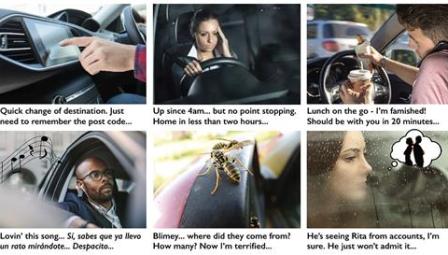NEIL WORTH
Recognizing the danger of distractions and knowing how to keep them to a minimum is a vital part of driving safely. Where drivers divide their attention between the main task of driving and a secondary, distracting task, there will be a negative effect on driving performance.
[dropcap]S[/dropcap]ensible lane choice can disappear, reactions are slowed, observations become more fixed, all-round scanning stops, drivers get too close up behind others and find it hard to keep speeds consistent. They feel less in control of the environment, they are more likely to become stressed, and this can lead to tiredness and/or anger.
 By effectively managing all the potential distractions we face as drivers, we will be able to anticipate hazards, become smoother and calmer in our driving and stay on the right side of the law.
By effectively managing all the potential distractions we face as drivers, we will be able to anticipate hazards, become smoother and calmer in our driving and stay on the right side of the law.
We are also less likely to be involved in a collision or near miss. We just need to ensure we have the willpower to make it happen!”
Below, therefore, are six tips for banishing distractions on road journeys:
Leave the phone alone
Unless it is an emergency, you must not use your phone whilst driving (6 points, £200 fine). Consider putting it out of reach to remove the temptation. Younger drivers call the glove box the phone box. Switch the phone to silent and turn off the Bluetooth: this will prevent messages coming through, but it is still available in an emergency.
Journey’s end
Plan the journey in advance so that you are aware of your approximate route. Satnavs are great for the last part of a journey if you have not been there before, so how about using Google Streetview before you go? This will give you a feel for the destination and where the turnings are, so it helps reduce stress as the route will feel familiar.
Music presets
Choose your favourites in advance such as on your phone’s playlist, with a stack of CDs – or preset your favourite radio stations. This ensures you don’t need to do any fiddling on a journey. Keep the volume down to a reasonable level to allow you to have more awareness of what’s going on around you.
The restaurant on wheels is closed
Consider having breakfast before you set off for work, not while you’re on the way. For longer trips, plan regular drinks breaks. Yes, cars have cup holders but when you’re driving, you take a risk by choosing to eat and drink as well.
Keep fresh and alert
We tend to look for distractions on long journeys to ease the boredom. Much better to make regular stops of at least 15 minutes every two hours or 100 miles. Get some fresh air by walking around, have some coffee or light refreshments and enjoy a short power nap.
Occupy your passengers
If you’re travelling with young children, make sure there is plenty to keep them occupied, as this will help ensure they don’t distract you. Who wants the ‘are we nearly there yet?’ question five minutes after setting off? Older children should be more able to understand the risks, so you can use them as a second pair of eyes. This helps teenagers to develop hazard perception skills early.
Neil Worth is road safety officer with GEM, an independent driver-based road safety association in Europe




